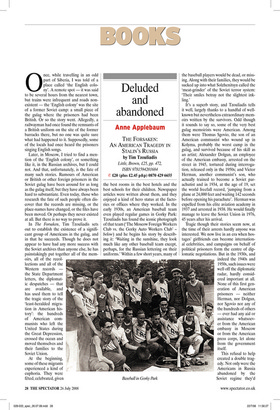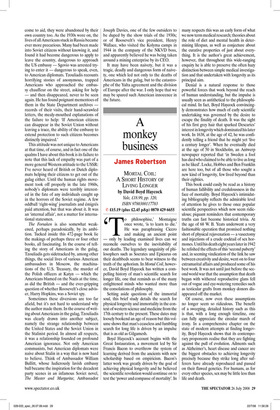Deluded and abandoned
Anne Applebaum
THE FORSAKEN: AN AMERICAN TRAGEDY IN STALIN’S RUSSIA by Tim Tzouliadis Little, Brown, £25, pp. 472, ISBN 9781594201684 ✆ £20 (plus £2.45 p&p) 0870 429 6655 Once, while travelling in an odd part of Siberia, I was told of a place called ‘the English colony’. A remote spot — it was said to be several hours from the nearest town, but trains were infrequent and roads nonexistent — the ‘English colony’ was the site of a former Soviet camp: a small piece of the gulag where the prisoners had been British. Or so the story went. Allegedly, a railwayman had once found the remnants of a British uniform on the site of the former barracks there, but no one was quite sure what had happened to it. Supposedly, some of the locals had once heard the prisoners singing English songs.
Later, in Moscow, I tried to find a mention of the ‘English colony’, or something like it, in the Russian archives, but I could not. And that, unfortunately, is the fate of many such stories. Rumours of American or British or other foreign prisoners in the Soviet gulag have been around for as long as the gulag itself, but they have always been hard to substantiate. Even today, those who research the fate of such people often discover that the records are missing, or the place-names have changed, or the files have been moved. Or perhaps they never existed at all. But there is no way to prove it.
In The Forsaken, Tim Tzouliadis sets out to establish the existence of a significant group of Americans in the gulag, and in that he succeeds. Though he does not appear to have had any more success with the Soviet archives than anyone else, he has painstakingly put together all of the memoirs, all of the recollections and all of the Western records — the State Department letters, the diplomatic despatches — that are available, and has used them to tell the tragic story of the ‘least-heralded migration in American history’: the hundreds of American communists who left the United States during the Great Depression, crossed the ocean and moved themselves and their families to the Soviet Union.
At the beginning, some of these migrants experienced a kind of euphoria. They were fêted, celebrated, given the best rooms in the best hotels and the best schools for their children. Newspaper articles were written about them, and they enjoyed a kind of hero status at the factories or offices where they worked. In the early 1930s, an American baseball team even played regular games in Gorky Park: Tzouliadis has found the iconic photograph of that team (‘The Moscow Foreign Workers Club vs. the Gorky Auto Workers Club’ – below) and he begins his story by describing it: ‘Waiting in the sunshine, they look much like any other baseball team except, perhaps, for the Russian lettering on their uniforms.’ Within a few short years, many of the baseball players would be dead, or missing. Along with their families, they would be sucked up into what Solzhenitsyn called the ‘meat-grinder’ of the Soviet terror system: ‘Their smiles betray not the slightest inkling.’ It’s a superb story, and Tzouliadis tells it well, largely thanks to a handful of wellknown but nevertheless extraordinary memoirs written by the survivors. Odd though it sounds to say so, some of the very best gulag memoirists were American. Among them were Thomas Sgovio, the son of an American communist who wound up in Kolyma, probably the worst camp in the gulag, and survived because of his skill as an artist; Alexander Dolgun, an employee of the American embassy, arrested on the street in 1945, tortured during interrogation, released only in the 1950s; and Victor Herman, another communist’s son, who actually trained to become a Soviet parachutist and in 1934, at the age of 19, set the world freefall record, ‘jumping from a plane at 24,000 feet and waiting 142 seconds before opening his parachute’. Herman was expelled from his elite aviation academy in 1937 and arrested in 1938. He would finally manage to leave the Soviet Union in 1976, 45 years after his arrival.
Tragic though their stories seem now, at the time of their arrests hardly anyone was interested. We now live in an era when hostages’ girlfriends can become international celebrities, and campaigns on behalf of political prisoners form the centre of diplomatic negotiations. But in the 1930s, and indeed the 1940s and 1950s, such issues were well off the diplomatic radar, hardly considered important at all. None of this first generation of American prisoners — neither Herman, nor Dolgun, nor Sgovio nor any of the hundreds of others — ever had any aid or assistance whatsoever from the American embassy in Moscow or from the American press corps, let alone from the government itself.
This refusal to help created a double tragedy. Not only were the Americans in Russia abandoned by the Soviet regime they’d come to aid, they were abandoned by their own country too. As the 1930s wore on, the lives of all Americans stuck in Russia became ever more precarious. Many had been made into Soviet citizens without knowing it, and found it had become dangerous to apply to leave the country, dangerous to approach the US embassy — Sgovio was arrested trying to enter it — dangerous to speak, even, to American diplomats. Tzouliadis recounts horrifying stories of anonymous, trapped Americans who approached the embassy chauffeur on the street, asking for help — and then disappeared, never to be seen again. He has found poignant mementoes of them in the State Department archives — records of their visits, their hand-scrawled letters, the mealy-mouthed explanations of the failure to help: ‘If American citizens can disappear in the Soviet Union without leaving a trace, the ability of the embassy to extend protection to such citizens becomes distinctly impaired.’ This attitude was not unique to Americans at that time, of course, and in fact one of the qualms I have about this book is its failure to note that this lack of empathy was part of a more general Western attitude to the USSR: I’ve never heard of British or Dutch diplomats helping their citizens to get out of the gulag either. Until the human rights movement took off properly in the late 1960s, nobody’s diplomats were terribly interested in the fate of any individuals caught up in the horrors of the Soviet regime. A few oddball ‘right-wing’ journalists and émigrés paid attention, but that was about it. It was an ‘internal affair’, not a matter for international statesmen.
The Forsaken is also somewhat weakened, perhaps paradoxically, by its ambition. Tucked inside this 472-page book lie the makings of perhaps three or four other books, all fascinating. In the course of telling the story of Americans in the gulag, Tzouliadis gets sidetracked by, among other things, the social lives of various American ambassadors in Moscow, the machinations of the U.S. Treasury, the murder of the Polish officers at Katyn — which the Americans blamed on the Nazis at the time, as did the British — and the ever-gripping question of whether Roosevelt’s close adviser, Harry Hopkins, was a Soviet spy.
Sometimes these diversions are too far afield, but it’s not hard to understand why the author made them. In the course of writing about Americans in the gulag, Tzouliadis was clearly drawn into another subject, namely the strange relationship between the United States and the Soviet Union in the Stalinist period. In almost all respects, it was a relationship founded on profound American ignorance. Not only American communists, but American diplomats were naive about Stalin in a way that is now hard to believe. Think of Ambassador William Bullitt, whose ludicrously lavish embassy ball became the inspiration for the decadent party scenes in an infamous Soviet novel, The Master and Margarita; Ambassador Joseph Davies, one of the few outsiders to be duped by the show trials of the 1930s; or of Roosevelt’s vice president, Henry Wallace, who visited the Kolyma camps in 1944 in the company of the NKVD boss, and apparently believed he was being taken around a mining enterprise by its CEO.
It may have been naivety, but it was a tragic, deadly and dangerous form of naivety, one which led not only to the deaths of Americans in the gulag, but to the catastrophe of the Yalta agreement and the division of Europe after the war. I only hope that we may be spared such American innocence in the future.



























































 Previous page
Previous page